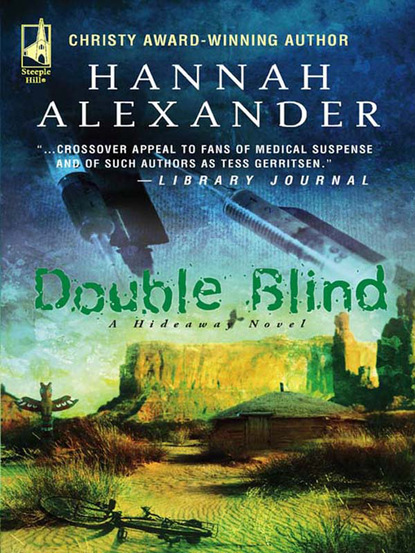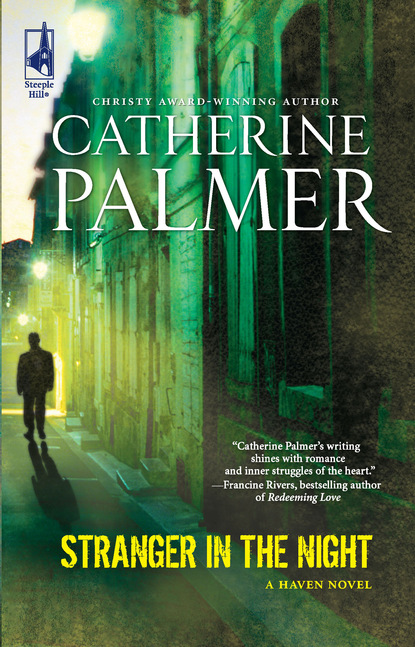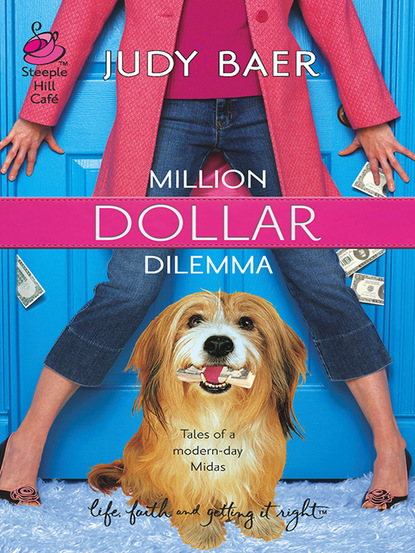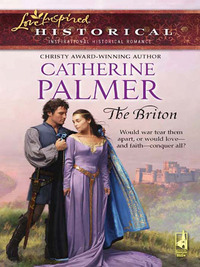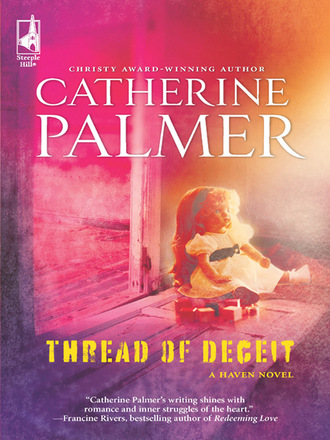
Полная версия
Thread Of Deceit
“Exactly where is the paint?”
“It’s around.”
She flipped open her notebook. “How many rooms at Haven have lead paint?”
“A few.” He reached out and pinched the notebook between his thumb and forefinger, slid it from her hand and folded it shut. “We’re dealing with it. That’s all. No story.”
Returning the notebook to her, he smiled. The parentheses were absent. “Thanks for dropping by Haven, ma’am. Now if you’ll excuse me, we’re in the middle of activity change, and I need to check on my crocheters.”
“Did you say crochet?”
She followed him out of the office, scrambling to reopen her notebook and get the cap off her blue ink pen. He lifted a hand as a new group of youngsters took to the makeshift basketball court. Several waved back, some shouting, “Hey, Uncle Sam!”
He strode toward a row of doors that Ana suspected had once led to offices. Stopping at the first in line, he peered inside the small room. “Hey, Terell, how’s finger painting?”
“Good. We got six today.” A large man looked up from a table spread with newspapers. Like Sam, he had a military haircut and arms sculpted with muscle. His long legs, bare and ebony hued, ended in white socks and a pair of the largest sneakers Ana had ever seen. A half-dozen children clustered around him, their fingers and faces smeared with blue, red and yellow tempera paint.
“You showing around a new volunteer?” Terell asked.
Sam glanced over his shoulder at Ana. “Didn’t know you were still here.”
“I’m taking the tour.”
He turned away, the big shoulder in her face, and addressed the children. “She’s a newspaper reporter. Her name is Miss Burg.”
“Burns.”
“Terell Roberts is my partner,” Sam told her. “T-Rex, who’ve you got there?”
Ana shifted her focus to the little girl on Terell’s lap. Fairy-tale princess golden curls crowned her head, but there the image ended. Thin and dirty, the child wore a small white T-shirt and a pair of badly stained purple shorts. Her feet were jammed into sandals at least two sizes too small, crowding her tiny pink toes. Nestled close to Terell, she leaned her head against his broad chest. His arm circled her as she turned sad blue eyes on Ana. Noting that one cheek appeared swollen and tinged with hot pink, Ana’s instinctive alarm system went off. Someone had slapped the child—and not long ago.
“This is Brandy,” Terell said. He bounced her on his knee. “She’s not feeling too happy today. But we’re gonna fix that, huh, sugar-pie? Do some painting, maybe eat a bowl of popcorn.”
The child stretched up and planted a kiss on the man’s cheek. Ana felt queasy.
“Who hit her?” she demanded.
Terell’s head shot up, his eyes suddenly hooded. “Ma’am, I’m taking care of that,” he said in a low voice. “You all get on with your tour now.”
“See you at the next activity change,” Sam told his partner as he shut the door. Before Ana could speak again, he marched on to another room.
“Hey, Lulu,” he said, leaning through the open door. “What are we up to this afternoon?”
Ana peered around his shoulder. A woman with light brown skin perched on a green plastic chair that sagged precariously under her weight. Eight children sat cross-legged at her feet on the concrete floor. “We’re reading Peter and the Wolf, ” she announced, holding up a large book. “Then we’ll listen to the music.”
“You kids be good for Lulu,” Sam said, stepping away from the room.
“Hey, did you see that child’s face—back in the other room?” Ana demanded, hurrying to keep pace with him. “The little girl named Brandy? Someone had slapped her.”
“Listen, Miss Burns.” He swung on her. “I appreciate your interest in Haven and our children. If you want to write an article about lead paint, I can’t stop you. But I have nothing more to say.”
Ana pursed her lips as she followed him to another room. She knew she had not imagined that bruise on Brandy’s face. And the way Terell Roberts had been holding the child unsettled her. Vulnerable children hidden away with grown men inside small rooms did not paint a pretty picture in her mind.
Her heart hammering, Ana paused at the third in the line of classrooms. A young man sat with a group of older children at a round table littered with hammers, nails, blocks of wood screwdrivers and various lengths of wire. Spotting Sam, he shrugged and threw up his hands.
“Same bunch,” he said. “Granny didn’t send hers over at activity change, so I kept these I already had. It’s no big deal, sir.”
“That’s a great attitude, Abdul, but everybody gets a turn at crocheting, just like everybody gets a turn at tools.” Sam gave a thumbs-up. “Let me check on Granny for you.”
“Thanks, sir.”
Sam walked to the last room and poked his head through the open doorway. “Well, hello there, Granny. Looks like your crew is busy.”
An elderly woman with snowy curls and a black velvet pillbox hat peered at him through oversize glasses. “What’s that you say, Mr. Hawke?” she asked loudly.
“I said you look busy here.” He raised his voice. “Nice work!”
Ana studied the center’s director as he stepped into the room and crouched down with the children. On first analysis, Sam Hawke seemed like a decent enough man. She appreciated the stringent rules and the emphasis on respect at the center. The volunteers clearly enjoyed their work, and most of the kids who dropped in appeared happy.
But her introduction to Terell Roberts still bothered her. What had been going on in that small room? Sam Hawke’s presence in such a place also raised questions. What had motivated an educated male in the prime of his life to take on the job of managing a run-down inner-city operation constantly threatened with closing? If the man enjoyed sports, he ought to be coaching a team, or working at a country club somewhere. It didn’t make sense.
What kind of future could Sam Hawke or Terell Roberts have here at Haven? If the recreation center had a large budget and generous donors, the lead paint might not be a problem. But Carl had called Haven a shoestring operation, and the place obviously didn’t generate enough financial support to pay two adults a decent salary. Sam and Terell would be living hand to mouth…unless they were using the building as a front to make money another way.
Ana’s blood raced at the possibility that she might uncover a real story at Haven. Oblivious to her thoughts, Sam hunkered down on the floor and picked up a length of pale blue yarn and a crochet hook. A girl—about ten, Ana guessed—leaned against his shoulder as she tried to show him how to loop the yarn onto the hook. He gritted his teeth, the muscles in his jaw rippling as he thumbed the delicate yarn.
Why this fascination with children? Prickles of alarm shot through Ana like thin, sharp needles at the memory of the way Terell’s hand had rested on little Brandy’s leg. The unhappiness in the girl’s blue eyes was palpable. She had kissed him, but had he slapped her only moments before?
“Tenisha, you’ve got me beat on this one,” Sam said, handing her the crochet hook and a tangle of yarn.
“Aw, you can do it, Uncle Sam.” She looked up at him. “You just have to try.”
“Tell you what, young lady. You play some basketball with me this afternoon—”
“No, I—”
“Now, don’t interrupt, Tenisha.” He held up a big index finger. “Remember the rules? Here’s a proposal for you. Try basketball this afternoon, and tomorrow I’ll come back and let you and Granny help me get started on crochet.”
“But I can’t play basketball, Uncle Sam. I can’t run hardly at all, y’know.”
“Well, how would I know that? I haven’t seen you ever try.”
She gazed down in her lap for a moment, her face glum.
“Do we have a deal?” he asked.
“Okay,” she said in a tiny voice.
“Great.” He gave her a solid pat on the back, and she brightened. Then he raised his voice to the other adult in the room. “Now, Granny, it’s time for activity change. These kids need to go try the tools.”
“What you talkin’ ’bout, boy?” The elderly woman squinted at him over the top of her glasses. “Fry the rules?”
“Tools!” he shouted, then muttered, “We’ve got to get you a hearing aid, Granny.”
As the youngsters scampered to their feet, Ana watched Tenisha lose her balance and stumble into a boy’s path. He barked in anger and gave her a shove. At that, Sam reached down and lifted the boy off his feet.
“Ladies first, Gerald,” he said as he held the youth high, giving Tenisha time to pick her way toward the door. Her unsteady gait revealed cerebral palsy, Ana surmised. So why had Sam Hawke urged the girl to attempt a sport that would only cause further embarrassment? Again, she felt the twinge of alarm and distrust.
Waiting for the group to file toward the toolroom, Ana noticed a figure seated in a shadowy corner at the end of the row of doors. She took a couple of steps closer and discerned a pair of skinny legs emerging from a green skirt. The girl wore the requisite white T-shirt and a pair of pink plastic sandals. Her hair, pulled back into a long braid, gleamed like black silk. She blinked at Ana, her large brown eyes wide.
“Hi.” Ana tried giving a little wave. She’d never been much good with children.
The girl looked away.
Well, that’s that.
Turning back, Ana nibbled a fingernail as she waited for Sam to complete the activity change. If Haven was as positive a place as it proclaimed, an article on the center’s activities might make a good feature for the Everyday section. She would suggest it to the editor.
Her own focus had to be the lead paint problem. Carl had wanted her to use Haven in the story, and she couldn’t very well turn it in without a single decent quote or even a pertinent fact or two about the place. She had to find out which parts of the building still contained the old paint, whether these children were at risk, how Sam intended to fix the problem, and where he would get the money to pay for it.
If the other sources on her list proved as uncooperative as this one, she would be hard-pressed to finish the series in two weeks. The memory of her editor’s promised reaction to such a failure chilled her. She tried to put it out of her mind. Why think the unthinkable?
As Sam stood at the door watching the new bunch of children settle in with Granny and her crocheting, Ana ventured another glance at the girl in the corner. Gazing back at the tall visitor, the child wore an expression of such emptiness, such sad hollowness, that Ana caught her breath. At the look on the girl’s face, a painful ache stirred to life inside Ana, and despite her best effort, she couldn’t immediately suppress it.
“Don’t you want to crochet?” Ana blurted out. She pointed to Granny’s room. “They’ve started a new group.”
The girl turned away in silence, her profile lovely and delicately haunting. Ana swallowed, wanting to go to the girl, to touch her somehow.
“Got the room switch taken care of.” Sam Hawke’s voice at her ear startled Ana. “Miss Burns, I need to ask you to leave now. We don’t allow anyone but volunteers and kids in the building unless they have a good reason.”
“I have a great reason,” she replied. “I want to interview you about your lead paint problem.”
His blue eyes fastened on her, and she knew exactly how an ant must feel as someone’s heel bore down on it.
“I’m not giving you an interview on Haven’s lead paint problem.” He enunciated each word as though she had as great a hearing loss as Granny. “Not today, not tomorrow, not ever.”
“I’ve been assigned this story,” she said as he turned his back on her and started toward the offices. She strode after him. “Haven will benefit from it. It’s obvious you serve needy kids here. Like that girl in the corner—”
“What girl?” He swung around.
“Tut-tut. No interrupting, sir.” She gave him a mock salute, then gestured behind her. “Back there. In the shadows. Who is she?”
He peered over Ana’s shoulder. “I haven’t been able to get her name. She showed up here a couple of weeks ago, but we can’t coax her out of the corner. She doesn’t speak English.”
“Now see? If Haven had to shut down because of the lead paint, that child might not have a place to go.”
“Haven is not going to shut down.”
“How are you planning to fix the problem?”
His face darkened. As a boy ran past with a basketball, Hawke snagged him. “Hey, Ramone, see Miss Burns to the door, would you?”
“Yes, sir.” The young man smiled. “C’mon with me, ma’am. You got to check out before you can go. And we need your T-shirt, too.”
Ana glared at Hawke’s broad-shouldered back as he headed toward his office. He thought he’d gotten rid of her. But he didn’t know Anamaria Burns.
No, sir.
He was staring through the window, thinking about what had happened in Springfield. Since the phone call from his associate three nights before, an acute pain had settled behind his eyes, and he had not slept well. Nothing could be resolved, of course, until he had more information.
What exactly had occurred that night? Who had done it? How much was known?
Despite the lack of details, he had begun working out his own answers to questions that might arise. He shouldn’t give the issue much weight, he reminded himself, because he really hadn’t been involved. The incident had occurred in another state, and he wasn’t responsible for it. If people didn’t take proper precautions, trouble usually found them, and they had no one but themselves to blame. Long ago, he had learned that he could not depend on anyone but himself to take care of things. No one had ever looked out for him, yet see how far he had come.
People counted on him now, and this gave him tremendous power. People feared him. They needed him. And he could demand their silence. Even if this particular situation blew up, he knew his colleagues would remain loyal. They would have no other choice.
As for himself, he would do just as he always had. Things would turn out well. He had organized everything so carefully, putting the building blocks in perfect order, setting each of the safeguards in place. He was cautious at all times, so that nothing could catch him by surprise.
Still, he jumped when his cell phone rang. Turning from the window, he put the phone to his ear as he dropped to the edge of a chair. “Yes?” Keeping his voice low, he spoke into the receiver.
“Hey, this is Sam Hawke over at Haven. How are you today, sir?”
The light tone jangled his nerves. He frowned. Not the call he’d been hoping for.
“Fine, and you?” he responded, forcing civility.
“Good.” There was a brief pause. “Listen, I thought I’d better let you know that someone from the Post-Dispatch dropped by today.”
“A reporter?” His nostrils flared as he took in air. “Why? What did he want?”
“It was a woman. She’s doing an article on our lead paint problem. I think Davidson may have put her up to it.”
“Davidson? Why would he do that?”
“I don’t know, sir. I can’t see how that kind of publicity can be good for us.”
“Absolutely not.”
“Maybe Davidson doesn’t see this situation the way I do, but I chose not to cooperate with the lady. We’re having enough trouble raising money without the newspaper dragging our name through the mud.”
“What did you tell this reporter?”
“That we’re aware of the problem and plan to fix it.”
“Good.” He dug a handkerchief from his pocket and blotted his forehead. The pain behind his eyes was intense. “I affirm your decision completely, Sam. You don’t need reporters nosing around there, that’s for sure.”
“I agree. I thought I’d better let you know in case Davidson mentions it.”
“Certainly. I’ll make sure he understands our point of view. I may give him a call right now, in fact. We need to be on the same page.”
“Great. Thanks, sir.”
“Listen, Sam…if she comes around again, let me know.”
“I doubt she’ll be back. I made my position clear.”
“Excellent. And again, thank you for the call. You were right to bring me up to speed. Anything like this…don’t hesitate to phone.”
“Will do. Better run.”
As the phone went dead, he let out a hot breath. Lovely. A reporter. He should have gotten a name. Clenching his fist around the phone, he turned back to the window.
He stood, stretched his stiff muscles and crossed toward the door. He needed to make some phone calls, but they could wait. Right now, he was going to have to do something about this headache. He hadn’t visited his special closet in many months, and he preferred to keep it that way. But commonplace antidotes didn’t work for him as they did for others. He was unique in so many ways. As usual, he would have to take care of himself. He always had.
Again I see the lightbulb, and I am glad. I close my eyes. Maybe if I close them, I can hide. I want to hide, because I am afraid. Afraid of the room. The terrible room. And the man. The good mean kind cruel love-me hurt-me man.
I say a prayer now. Thank you, God, for the lightbulb.
This is not a prayer I learned in church. My mother used to take me to church, but now we do not go. I have forgotten all those prayers.
I have not forgotten God. Has He forgotten me?
No. I know He is with me, because He gave me the lightbulb. When the pain begins, I open my eyes and look up at the ceiling. The white ceiling. Swirls and patterns, like a white river. Like snow on a river.
I see that lightbulb, and I am not afraid. It glows, shining into my eyes, and I stare at it. I stare and stare until my head hurts. I stare until the blackness comes. I command my eyes to travel into the light, into the whiteness of the bulb, the roundness, the glass, the ceiling, the swirls…
…and it is the sun, the bright sun, and I am running up the hill with my little sister. Come, Aurelia! Hurry up! Mama is calling. Can’t you hear her? We will be late for supper! We will miss our beans and tamales.
Green grass cools our bare feet as we run. Our wet skirts slap against our thighs. We played in the stream near our house today, looking for treasures. We found a tire and a shoe. We found a plastic bottle. We found a battery. Oh, such treasures!
Hurry, Aurelia! I hear her laughing behind me, and I tug on her small hand.
We reach the lane, warm brown stones under our feet. Hot dust swirling around our ankles. Broken glass—be careful, Aurelia! Watch where you are stepping! Don’t hurt yourself!
I take care of Aurelia, and she is safe with me. She laughs and laughs, as though missing our supper is part of the great adventure of this wonderful day. She knows I will get food for her, even if we miss the supper. Even if Mama puts everything away, I will find something for us to eat.
My feet bounce and skip and sing up the path, past the houses, past the wide porches and the children and the mamas and papas and the grandmas. I feel the sun shining on my face, warming my cheeks, kissing me with love. Oh, God, thank you for the sun! For the bright light. For Aurelia and the dusty path and the tamales waiting for us in our home.
Do I hear my mother’s voice? She calls! The smell of roses curls around me, and I am nearly home. Nearly there. I am coming, Mama! I am bringing Aurelia! She’s safe with me.
We run through the light, the heat, the brightness. We run up to our front door, out of breath, laughing, too silly to worry about tamales. I throw my head back, and my hair tumbles down behind me in a waterfall. The sun dances across my cheeks. I open my eyes and look into the sun, the bright white shining sun, the glowing glaring gleaming sun…
…and now I see that the sun is a round, white glass. It is small, and it hangs from the sky by a single black cord. It is the lightbulb. It has saved me again.
Thank you, God.
Chapter Two
S am spotted her the moment she stepped through the metal detector at the front door of Haven.
“Great,” he muttered.
Raydell Watson scowled as he followed the direction of Sam’s gaze. The brawny eighteen-year-old usually asked to work guard duty at Haven’s front door, and Sam had come to rely on him to keep troublemakers out of the recreation center. Despite Raydell’s youth, his dreadlocks, gold tooth and massive tattooed biceps made him an imposing barrier. He loved rap music, and his foul mouth had gotten him into trouble at the center more than once. A life spent mostly on the inner-city streets had hardened the boy at an early age. But to the best of Sam’s knowledge, Raydell had no gang or drug ties, and his loyalty to Haven was unquestionable.
A few minutes before, Raydell had relinquished his responsibilities to a younger boy and had come inside to cool off. Standing beside Sam, he watched the basketball game.
“It’s that newspaper reporter,” Sam said. “I’m supervising practice, and I don’t have time to talk to her this afternoon.”
Hadn’t he made it clear there would be no interview? Of course he had. But here it was just two days later, and she was back, sniffing around like a hound dog on a hot trail.
“Lucius, pick up your feet!” Sam barked as a boy barreled past, nearly tripping on his own sneakers.
“What’s a reporter want with you, man?” Raydell asked.
“The lead paint problem.” Sam had told the youth about the situation earlier. “She’s onto it. Keeps asking me questions that I don’t want to answer.”
“She don’t even see you standing over here,” Raydell observed. “Some reporter, huh.”
“I hope she doesn’t spot me, because I don’t intend to talk to her. I’ve only got two weeks left to come up with the money to fix the paint, and she could write things that would scare off donors. She could shut us down.”
“No way, man.”
“It’s possible. They say the pen is mightier than the sword.”
“Yeah, that’s why we carry guns in the hood.”
Sam cast the youth a skeptical eye. “And look what good it’s done you. No guns, my friend. And no reporters. I practically had to run her out of the building the other day. She’s trouble.”
“You already got enough of that.”
“No kidding.”
The woman headed straight for the office, head held high, dark brown hair swept up on top of her head like royalty. A queen expecting to command everyone in sight. What was her name? Burns or something, Sam recalled. She figured she was going to burn him. Splatter his sorry hide all over her newspaper. Slam the doors and lock them tight.
Not a chance. He had given his life to this place, and he believed without any doubt that God had commissioned him to the work he was doing with these children. Anything that rose against him became a part of the spiritual war he was fighting. And he certainly wouldn’t allow a prying reporter to sabotage his efforts.
At least she’d remembered the center’s rules and was wearing a plain white blouse. Tall and lean, she had the stride of a runway model as she crossed the floor in her belted slim gray slacks and high heels.
“Acts like she owns the place,” Raydell remarked.
Sam chuckled mirthlessly. “Yeah, comes gliding in here like a Stealth bomber out to do her damage.”
“Just let her try.”
“Calm down, Raydell. This is God’s battle.”
“She better not try nothing. Ain’t nobody messin’ with my people.”
Pumped up now, the young man was flexing his muscles and clenching his fists as if ready to knock the reporter out with a single punch. Sam shook his head and focused on the game again.
“Shoot, Abdul!” he shouted. “You’re in perfect position. Go for it!”
Raydell elbowed Sam and pointed to a heavyset teenager standing flat-footed beneath the basket. “Hey, look at Natasha. She got concrete shoes, or what?”
“Jump, Natasha!” Sam called out. “Get those feet off the floor, girl!”
Raydell threw back his head and laughed. “Aw, man, that’s pitiful! I’m going back outside where at least I got something interesting to watch.”


